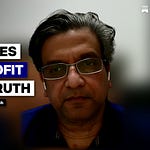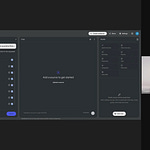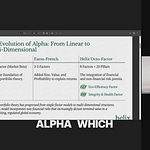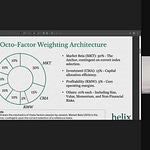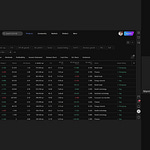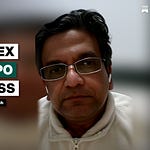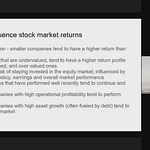In today's rapidly evolving global landscape, staying ahead of market shifts is more critical than ever. We're currently operating in a complex environment, shaped by geopolitical tensions, evolving economic data, and a fundamental re-evaluation of sustainability. This update aims to provide you, our valued individual LPs and professional investors, with a clear understanding of where we stand, where we're headed, and how these forces might impact your portfolios.
The Macro Pulse: Tension and Data Dominance
The most immediate factor impacting markets this week is the escalating geopolitical tension in the Middle East, specifically between Israel and Iran. News of heightened conflict, including reports of potential US military involvement, creates significant uncertainty. We’re seeing a classic "risk-off" reaction:
Oil Prices: Spiking due to fears of supply disruption, especially from the Strait of Hormuz, a critical global choke point. This surge injects a "geopolitical premium" into prices.
Safe Havens: Gold and, at times, the US Dollar, see increased demand as investors seek safety.
Equities: Global stock markets face pressure as uncertainty breeds caution.
Beyond the headlines, we're keenly watching key economic data. In the US, the Core PCE Price Index (Friday) is paramount – it's the Federal Reserve's preferred inflation gauge. A higher reading could delay anticipated rate cuts, while a lower one might offer relief. Global PMI data, providing real-time insights into business activity, also paints a mixed picture of confidence amidst tariff uncertainties. Central bank commentary, particularly from Fed Chair Jerome Powell this week, will also be scrutinized for clues on future monetary policy.
Key takeaway for you: Expect continued volatility. Short-term market movements will be highly sensitive to geopolitical news. Diversification and a disciplined approach remain your best defense in such times.
Oil Market: A Tug-of-War
The oil market is a vivid illustration of how geopolitics can temporarily overshadow fundamentals. While fear of Middle East supply disruption is driving significant price surges now, the underlying picture is more nuanced. Global oil inventories have been building, and OPEC+ is gradually unwinding some production cuts. Global demand growth is also expected to slow, particularly in developed economies.
Our view: Unless there's a sustained, major disruption (e.g., prolonged closure of the Strait of Hormuz), these drastic price spikes are unlikely to be sustainable long-term. The market's fundamentals suggest a well-supplied environment, and once immediate geopolitical fears subside, economic realities and the ongoing energy transition will likely cap further upside.
Corporate Earnings: Resilient, But Cautious
Global corporate earnings present a mixed but generally resilient picture.
Q1 2025 Performance: In the US, S&P 500 earnings saw robust 13% year-on-year growth, exceeding expectations across most sectors. This highlights the underlying strength of American corporations, particularly large tech firms leveraging AI advancements.
Full-Year Outlook: While Q1 was strong, the path ahead is less certain. Global GDP growth is expected to be slower in 2025, and rising trade barriers (like tariffs) could put pressure on corporate margins. Companies are increasingly giving conservative guidance, citing rising input costs and reduced visibility.
What this means: While some sectors and regions show strong fundamental health, the broader macro headwinds could temper overall earnings growth as the year progresses. Focus on companies with strong balance sheets and adaptable business models.
Eco-Economics: A Dual Lens for Investors
This brings us to a crucial area: eco-economics – the interwoven relationship between financial, social, and environmental sustainability. This framework offers compelling insights for both long-term growth and potential short-selling opportunities.
Why "Eco-Aligned" Businesses Win (Higher FCF & ROIC):
Companies that genuinely embed eco-economics principles into their operations tend to outperform. Why?
Cost Savings: Resource efficiency (less energy, water, waste) directly lowers operating expenses. Proactive environmental management also reduces regulatory fines and compliance costs.
Revenue Growth: Consumers and businesses are increasingly favoring sustainable products and services, leading to greater market share and premium pricing power.
Lower Cost of Capital: ESG-focused investors are drawn to these companies, potentially lowering their borrowing costs and increasing access to capital through "green" financing.
Reduced Risk: Resilient supply chains, strong social licenses to operate, and robust governance minimize disruptions and reputational damage.
Innovation: A focus on sustainability often sparks innovation, creating new products and competitive advantages.
These factors combine to generate more Free Cash Flow (FCF) – the cash a company generates after covering its operating and capital needs – and higher Return on Invested Capital (ROIC) – a measure of how efficiently a company uses its capital to generate profits. This translates directly to better long-term shareholder value.
Identifying Short Opportunities: Greenwashing & Broken Promises:
On the flip side, the rising scrutiny on sustainability claims creates significant short-selling opportunities. Watch for companies that:
"Greenwash": Make vague, unsubstantiated, or misleading claims about their environmental or social performance.
Drop or Delay Targets: Quietly roll back ambitious climate or ESG commitments or remove sustainability metrics from executive compensation.
Face Litigation: Are subject to lawsuits or regulatory investigations for false or misleading green claims. We've seen a surge in "climate-washing" cases, hitting sectors like fast fashion, aviation, automotive, and even financial products. A recent case involving a major fossil fuel company in France defending its "climate strategy" is a precedent-setting example.
These "false green" companies face substantial financial risks: reputational damage, heavy fines, legal costs, and loss of market share. This divergence between ambitious talk and insufficient action can create compelling short-selling entry points.
Looking Ahead
2025 is a year where adaptability and informed decision-making will be key. While geopolitical headlines will continue to drive short-term volatility, understanding the underlying economic shifts and the rapidly evolving landscape of eco-economics will be crucial for navigating both risks and opportunities.
Thank you for your trust and partnership. We remain committed to keeping you informed and guiding your investments through these dynamic times.



